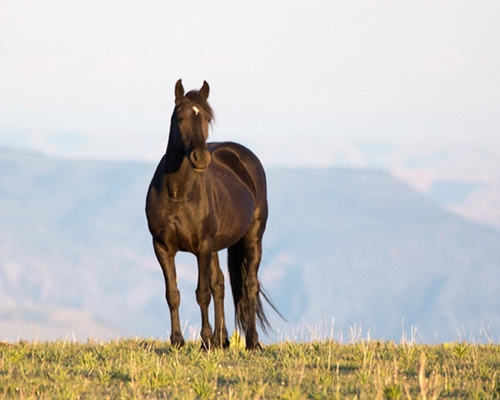
Pryor Mountain mustang
On August 23, 2022, the U.S. Fish and Wildlife Service (Service) issued a notice in response to petitions seeking to list, delist, or revise the critical habitat of four species under the Endangered Species Act (ESA). The Service found the petitions to list the Fish Lake Valley tui chub (Siphateles bicolor ssp. 4) and to delist the southern sea otter (Enhydra lutris nereis) “present substantial scientific or commercial information indicating that the petitioned actions may be warranted,” and are therefore initiating status reviews to determine whether to list and delist the species, respectively. The Service also found the petitions to list the Pryor Mountain mustang population (Equus caballus) and to revise the critical habitat designation for Sonora chub (Gila ditaenia) do not present substantial information indicating the petitioned actions may be warranted and are therefore not initiating status reviews for those two species.
Section 4 of the ESA requires the Service to make a finding in response to a petition to list or delist a species as endangered or threatened under the ESA within 90 days of whether that petition “presents substantial scientific or commercial information indicating that the petitioned action may be warranted.” If the Service finds the action may be warranted, it must initiate a status review of the species and issue a finding within 12 months indicating whether the action is warranted or not warranted. If warranted, the Service must publish in the Federal Register its plans to initiate the petitioned action, indicate the petitioned action is precluded by other regulatory proposals, or indicate the petitioned action is no longer necessary.
The Service considers a number of factors in determining whether a petitioned action may be warranted. For the Fish Lake Valley tui chub, the Service determined listing may be warranted based on the present or threatened destruction, modification, or curtailment of its habitat or range caused by agriculture, encroachment of aquatic plants, geothermal energy, and lithium mining, and on the threats climate change and stochastic events pose to its continued existence. The Service’s finding with respect to the southern sea otter was based on cited sources in the petition demonstrating a reduction of threats to its habitat curtailment and declining frequency of oil spills. For the Pryor Mountain mustang population and the Sonora chub, the Service concluded the petitions did not present substantial information indicating the petitioned action may be warranted.
With the Service’s finding on the Fish Lake Valley tui chub and the southern sea otter, the agency requests from the public scientific and commercial data and other information that could inform whether listing or delisting is warranted.
Nossaman’s Endangered Species Law & Policy blog focuses on news, events, and policies affecting endangered species issues in California and throughout the United States. Topics include listing and critical habitat decisions, conservation and recovery planning, inter-agency consultation, and related developments in law, policy, and science. We also inform readers about regulatory and legislative developments, as well as key court decisions.
Stay Connected
 RSS Feed
RSS Feed
Categories
- Alternative Energy
- Bald and Golden Eagle Protection Act
- Budget
- CEQA
- CESA
- Climate Change
- Congress
- Conservation
- Construction Projects
- Consultation
- Continuing Education
- Court Decisions
- Critical Habitat
- Delisting
- Endangered Species Act
- Event
- Fish & Wildlife Service
- Freedom of Information Act
- Government Administration
- Legal
- Legislation
- Listing
- Litigation
- Migratory Bird
- National Marine Fisheries Service
- NEPA
- Off Shore Wind
- Pacific Northwest
- project
- Publications
- Regulatory Reform
- Sacramento-San Joaquin Delta
- SEPA
- Speaking Engagements
- Supreme Court
- Texas
- Timberland
- Water Issues
